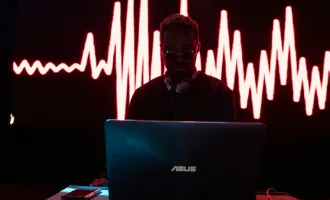
This Date in UCSF History: SF Supervisors Debate UCSF Animal Experiments
Originally published in Synapse - The UCSF student newspaper on Nov. 19, 1998.
The demonstrations against UCSF's hearing loss experiments on squirrel monkeys crossed into the domain of city government this week.
The experiments, conducted by Adjunct Professor Steven Cheung, are designed to study how the brain responds to injury and hearing loss.
On Tuesday morning, Nov. 17, a committee of the San Francisco Board of Supervisors heard public comment and voted to forward a resolution on the subject to the full board for consideration Nov. 23.
As originally drafted by a member of Yaki's staff, the resolution called for the immediate termination of the squirrel monkey experiments; the use of alternative research methods in place of testing on animals when available; and the upgrading of animal care facilities at UCSF.
But minutes before the hearing began, Yaki put forth amendments that his colleague Leslie Katz had introduced in consultation with UCSF Community & Governmental Relations Representative Joyce Newstat.
The amended version contained new language that angered opponents of the squirrel monkey experiments: Rather than resolving that “UCSF terminate the squirrel monkey experiment,” the amended resolution urged UCSF “to apply the above [humane] standards to the squirrel monkey experiment.”
Each side of the debate —UCSF and representatives of animal rights organizations— was allotted 20 minutes to present its arguments, followed by 90 seconds of floor time for individual members of the public.
Supervisors Yaki, Mark Leno, and Leslie Katz were present to hear the arguments. Zach Hall, vice chancellor for research, led the UCSF contingent.
“At UCSF, each animal study is examined by a committee on animal research, composed of scientists, vets, and members of the community,” he testified. “The hearing study that you are considering today is an example of just such research. It is meant to help the millions of Americans who suffer hearing disorders. For them, it is every bit as important as research on AIDS or cancer.”
Robert Schindler, MD, professor and chairman of the Department of Otolaryngology, supported Cheung's experiment. He noted that research by the department has led to the development of cochlear implants and hearing devices.
“We treat them [the animals] as though they were our patients,” he emphasized.
Founder of In Defense of Animals Elliott Katz, DVM, was visibly angered by the amended resolution. He scolded: “And then you come in here, Supervisor Katz pulls out the rug, puts in the language created by UCSF to undermine every piece of integrity you had in that resolution.”
R. W. Schulke, chairman of the city's Commission of Animal Control and Wellness, noted that he and his colleagues are not asking for an end to all animal experimentation.
“I realize that in order to advance science, sometimes animal experimentation must occur,” he said.
“But that does not mean that the oversight process for this experimentation shouldn't be overhauled. I see this resolution [in its original form] as a well-intended first step in the right direction of shared responsibility for animal experimentation oversight, and I truly hope that further dialogue between UCSF, the board of supervisors, and the caring, sophisticated Bay Area community will lead to a better, more complete supervision of these experiments.”
Jerry Vlasik, a physician who trained in the UC system and is currently practicing in Los Angeles, testified on behalf of In Defense of Animals.
He characterized as “preposterous” statements by Cheung and Schindler that “they treat their experimental animals like they treat their patients.”
Yaki and Leno interrupted the speakers at various points to ask whether or not alternatives to using the monkeys could be adopted, and why high decibel sounds were needed to induce hearing deficits.
They noted suggestions that cell culture be used in place of animal models. Studies of drug toxicity and efficacy on isolated cells are limited.
Jay Levy, UCSF professor of medicine and head of the laboratory for AIDS and tumor research, cited his own research to explain why in vitro testing cannot replace animal testing in all cases.
“We can watch while drugs stop HIV from growing in the test tube,” he said, “but when we put these drugs into a whole animal — brain, kidney, liver, and other organs— then we can know if the anti-HIV effects are beneficial compared to the harmful effects on the total body.”
UCSF psychiatry professor Allison Doupe explained the rationale for exposing the animals to sounds far higher than humans would ordinarily be exposed to in the workplace.
The resulting damage mimics the effects of longterm damage from lower-level assaults on the ear. After several hours of public comment, the committee members present voted two to one to forward the amended resolution to the full board for further action.
Yaki and Katz were for, Leno against.
Leno told Synapse he supported the original resolution and that he hoped to send “a strong message to UCSF” when the full board considers the matter on Monday, Nov. 23.
The Supervisors' hearing was preceded by a debate on the Chronicle editorial pages Nov. 16 between Vice Chancellor for Research Zach Hall and Andrew Rowan of the Humane Society of the United States.


